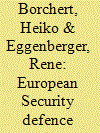| Srl | Item |
| 1 |
ID:
164624


|
|
|
|
|
| Summary/Abstract |
Arab Gulf countries have been trying to set up a local defense industrial base for decades. Recently, these efforts have become much more serious due to a changing geostrategic context, local transformation, and the striving for a more active foreign policy role beyond the region. Today's Arab Gulf defense pivot rests on four pillars: broadening the traditional defense-supplier base; establishing indigenous defense industries; setting up a defense-industrial network within and beyond the region; enlarging foreign policy clout by way of defense exports, defense-material donations, and third-country defense funding. Despite progress, challenges regarding strategic and financial stability and local skill sets remain.
|
|
|
|
|
|
|
|
|
|
|
|
|
|
|
|
| 2 |
ID:
052468


|
|
|
|
|
| Publication |
Dec 2003.
|
| Summary/Abstract |
The article analyzes what the European Security and Defence Policy means for Switzerland's security policy and the Swiss Armed Forces. We assume that in the long run, 'Europe' and the 'European cause' will be the strongest sources for legitimizing the use of force and for beefing up military budgets. However, as no country is able to raise the necessary financial resources on its own, European states will have to find new, innovative ways of pooling their resources and devising concepts of role specialization. The overall consequences of these developments will require politicians and military planners to focus more strongly on the strategic adaptability of the country's armed forces rather than on optimising reform at the operational level. We highlight the consequences for Switzerland by addressing the issue of forging strategic partnerships, adapting armament procurement and overhauling security and military planning processes.
|
|
|
|
|
|
|
|
|
|
|
|
|
|
|
|